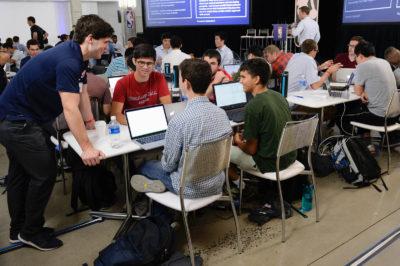
Boston University students Elizabeth Slade and Smeet Patel are introducing a BU chapter of the nonprofit, technology-based organization Hack4Impact this spring. The goal, Slade said, is to use computer science skills to help other nonprofits fulfill their humanitarian and social objectives.
Hack4Impact, which was founded at the University of Pennsylvania, uses technology to aid community organizations, according to Katie Jiang, co-director of the UPenn chapter of Hack4Impact Katie Jiang.
“Our mission is to increase awareness and engagement in tech for social good,” Jiang said. “We envision more open-source projects, research and university courses in the intersection between social impact and software engineering.”
In addition to striving to help the global community, Jiang said, the club also sets out to offer members experience in using technological skills.
“We are also invested in the education and growth of our members,” Jiang said. “We are mindful about creating a diverse and inclusive space for our members to thrive in and have an immense focus on community.”
Slade said in a phone interview that she believes the technological focus of the club can make a difference for club and community members alike. She added that the club will work with local organizations to develop their technological capabilities in order to help them with their community efforts.
The UPenn chapter developed a mapping tool last fall to help homeless community members have better access to local homeless shelters, Slade said. This spring, the BU chapter plans to work with a Bay Area organization that helps connect students with future careers, goals and interests.
“We want to work on technology that will help expand their platform to reach more students in more districts.” Slade said. “Right now, they’re in a very local district and they want to expand, so we’re basically [going to] work on technology that will help them expand.”
Slade said she hopes the group will provide members with experience in technical applications and computer languages such as JavaScript, CSS and HTML, in addition to methods of applying those skills to benefit others.
“I hope that it feels like Hack4Impact is a community of people that all have a collective, same mission and all collectively the same interests.” Slade said. “I hope it’s a really, really great experience for people that join, because I know it’ll be a great experience for me.”
Slade, who is studying computer engineering at BU, said she grew up with an interest in technology, but more specifically how technology could be used to help others. She said Hack4Impact combines both of her passions into one focus.
“I think the biggest reason why I decided to become an engineer was so that I could help people using technology,” Slade said. “So Hack4Impact is pretty much directly what I want to do in life.”
Several BU students said they saw the value an organization like Hack4Impact could bring, some saying they could see themselves joining the BU chapter.
College of Communication sophomore Noemi Arellano-Summer said that while the club is based at the university, the work they can do with outside organizations could leave an impact on communities beyond BU.
“It definitely seems more university-centered,” Arellano-Summer said. “But if a student were working in some other capacity in Boston, I think it definitely could spread.”
College of Arts and Sciences freshman Louis Decordova said he thinks the club could attract a lot of members because of the popularity and impact of computer science.
“I’m not sure if BU needs it, but once it’s introduced, I think a lot of people will be interested in it,” Decordova said of the chapter. “It’ll help students — it’ll help society — so I think it’s great.”
Similarly, Questrom sophomore Krushali Shah said she thinks the club will benefit students and the community alike.
“People who take CS will be more motivated to do something not just for themselves, but also for their environment,” Shah said.























































































































